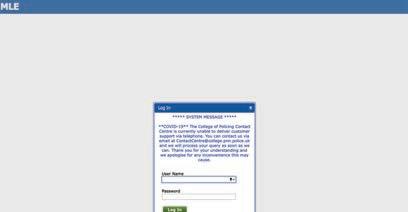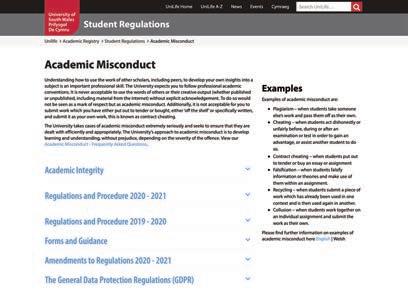
8 minute read
4. Course Content and Description
The course aims and learning outcomes are focused upon developing students acquiring the knowledge and practical skills needed to become an efficient and effective police officer. The educational aims and learning outcomes reflect the standards stated by the College of Policing and the Police Forces of England and Wales.
4.1 Course Aims and Outcomes
Advertisement
Understand the legal and professional responsibilities of policing as a profession, and modern policing strategies.
Employ an ethical approach to policing, maintaining the highest professional standards in providing service to the public.
Proactively embed equality, diversity and human rights considerations as a core function of professional practice.
Acquire and apply appropriate research skills in order to put evidence-based policing initiatives into practice.
Understand, employ and evaluate evidence-based initiatives in the context of preventative policing and problem solving.
Enable decision making founded upon critical thinking, in complex professional situations and contexts, demonstrating appropriate knowledge and application of powers, legislation and Authorised Professional Practice.
Enable the exercise of autonomy and professional discretion, as appropriate to the role of police constable.
Acquire, use and enhance professional communication and engagement skills, including effective use of social media in policing.
Acquire and demonstrate leadership, team working and partnership working skills in a policing context.
Develop and maintain professional resilience in dealing with challenging situations.
Actively engage in continual self-reflection, evolving strategies to improve own professional practice.
Your learning journey will consist of academic modules (see Course Structure) that has practical elements integrated into them. You will be required to evidence practical competency by completing an Operational Competency Portfolio (OCP) of the skills you have demonstrated in the workplace. You will need to achieve Independent Patrol Status (IPS) by the end of your first year and complete the portfolio by the end of year 2. To successfully complete your 2 year probationary period and attain the qualification, you will need to have evidenced all practice based competencies and passed all academic modules.
4.2 Course Structure
Graduate Diploma in Professional Policing Practice
All modules in this programme are core national policing curriculum modules and, as per College of Policing stipulation, must be non-compensatory/ condonable.
YEAR ONE
Module Titles All Modules are 10 Credits
Role of the Police
Responding to Incidents
Continuous Improvement
Working with Communities
Prevention and Protection
Evidence and Investigation
YEAR TWO
Module Titles All Modules are 20 Credits
Response Policing (Advanced)
Community Policing (Advanced) Modern Investigations (Advanced)
DHEP Student Journey Year 1
Months 1-6 | Initial Training Phase
Knowledge, Understanding and Practical elements of Year 1 curriculum. Police specific training e.g. IT, Officer Safety, Driving Course
Employer led delivery to ensure programme meets organisational needs. All academic assessments to be managed by the USW ensuring learning outcomes are met and learning meets academic standards.
OPERATIONALLY DEPLOYED
Months 7-9 | Tutoring Phase Months 10-12 | IPS Phase
1:1 Tutoring Period gathering evidence towards achieving Independent Patrol Status in Operational Competency Portfolio Mentoring Period on shift. Gather evidence towards Full Occupational Competence in Operational Competency Portfolio
Student development will be supported by a qualified tutor constable in the workplace within tutor pods until the student has evidenced the competence to patrol independently.
USW will continue to assess the academic capability through a series of assignments based on the student’s operational experience.
Year 2
Months 13-24 | Continuous Development
Consolidated Learning linked to Full Occupational Competence Advanced Professional Development in a specified area: • Response Policing • Neighbourhood Policing • Policing the Roads • Information and Intelligence • Conducting Investigations
Students should complete the OCP by the end of Year 2. USW will continue to assess the academic capability through a series of assignments based on the students’ operational experience. Students will achieve FOC by evidencing both academic achievement and demonstrating operational competence in the workplace.
Code of Ethics and USW Student rules must be maintained throughout
4.3 Your Learning
In addition to this Handbook, you will receive information packs from both your Force’s Police Human Resources department and the University Student Services team. At the start of the course, you will receive a number of sessions from both organisations that will cover a number of questions you may have, from accessing an email account to how many annual leave days you are entitled. These sessions will also provide you with an opportunity to ask any further questions you may have. The induction phase has been developed by both GC and USW to ensure that you receive the important information you need as a serving police officer and as a university student. During this week, you will also receive inputs from specialist departments, such the professional standards department, occupational health and the police federation. During induction, you will be given a detailed timetable of the initial training phase and route map of the entire two year programme.
Within this course, learning will be a mix of both lecturer-led and student-led inputs, depending on the topic. A wide variety of teaching methodologies are used in the presentation of lecture material in order to encourage and foster your learning capabilities, to enable you to achieve the aims of the course. Formal lectures are used to impart a pool of knowledge particularly in the early stages and also to define the basic areas of study. The learning processes are then continued, developed and consolidated through other methods, such as tutorials, project work, case studies, simulated scenarios and work-based learning to promote maximum participation by all students. Much of your learning will be distance on-line learning maximising technological opportunities.
You are ‘reading’ for a Level 6 qualification and to that end, we expect you to add to the basic framework we provide through wider and more detailed study. We are encouraging you to be a self-sufficient, lifelong learner that takes personal responsibility for your own continuous professional development. This is a practice-based qualification and as such, a significant portion of your learning will occur in the workplace. You will need to adopt a self-reflective approach and seek ways to develop yourself into being the best police officer you can be.
4.4 Access to Materials Online – Blackboard
The University’s virtual learning environment, Blackboard, provides access to information about your course and materials through your Course Organisation and for each of your modules to support your learning as set out in the Blackboard Minimum Requirements Policy at https://celt.southwales.ac.uk/policy/. Further details and help with using Blackboard can be found at: https://its.southwales.ac.uk/Blackboard/
Details of all your assessments are provided through Blackboard and shortnotice changes will also be posted here, so it is important to log in regularly.
Further on-line learning materials are offered by the Police and the College of Policing via a personal login account. https://www.mle.ncalt.com/Account/Login

GC’s online learning environment, Open Learning Academy, will give you access to additional learning materials. You will be provided with a link upon enrolment.

4.5 The Learning Process
You will be involved in four types of learning:
Contact with your lecturer (supported hours). Study outside class times as directed by your lecturer (directed learning). Study at your own initiative (independent learning). On the job training (work based)
Together, these make up the ‘total study hours’.
The proportion of supported hours, directed learning and independent learning will change during your studies. For example, in your first year you may have more supported hours in comparison to your second year as by this stage you will be capable of advanced independent learning.
You will receive protected learning time for off the job training across the programme. This includes supported learning, directed learning and independent learning, however, it should be noted that in order to maximise this learning opportunity and take advantage of the wealth of information available it is likely that you may need to carry out some study during your own personal time which is unpaid.

4.6 Academic Misconduct
The University of South Wales Academic Misconduct Regulations define academic misconduct as:
‘any action or attempted action that may result in creating an unfair academic advantage or disadvantage for any other member(s) of the academic community’
Developing knowledge often requires us to consider the work of other scholars and practitioners. For example, if you were analysing a famous work of art or piece of music, it would make sense to find out what other scholars have written about the subject as well as developing your own opinions. Understanding how to use the work of other scholars and practitioners, including your peers, to develop your own insights into a subject is an important professional skill.

The main categories of academic misconduct are as follows:
Intention to break the regulations Plagiarism Cheating Contract Cheating Falsification Recycling Collusion
As all students on this programme are serving police officers, you are subject to the ‘Code of Ethics’ and ‘Standards of Professional Behaviour’ set out by the police service. Any breaches of academic misconduct will be reported to the employer which may result in employer led disciplinary action.
The GC Policy for dealing with misconduct, underperformance and poor attendance can be found on the GC intranet.
Further guidance on referencing and how to avoid plagiarism is available on the Student Development and Study Skills website: https://studyskills.southwales.ac.uk/
4.7 Study Skills
A comprehensive list of helpful online resources and information related to study skills including writing, referencing and I.T. skills can be found at: https://studyskills.southwales.ac.uk/











